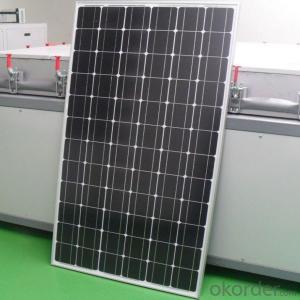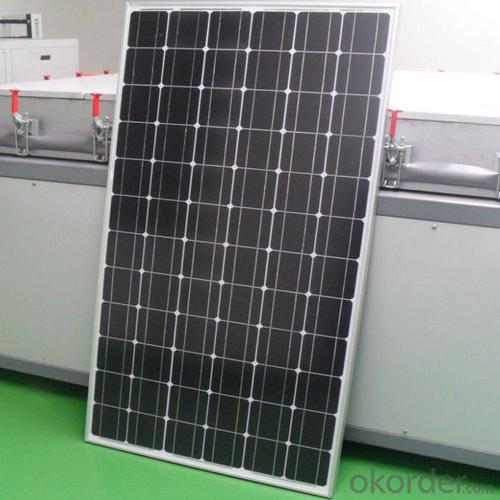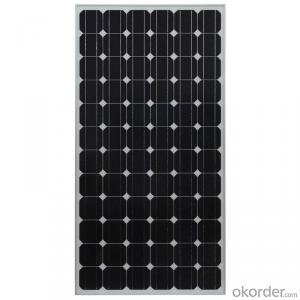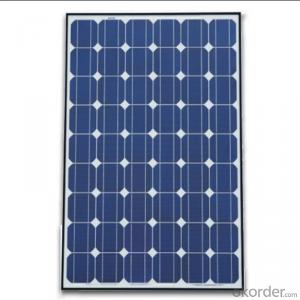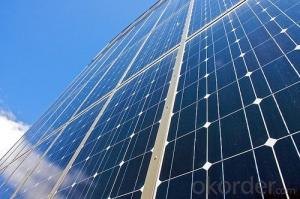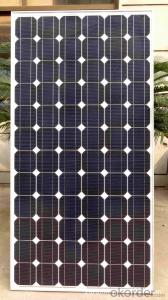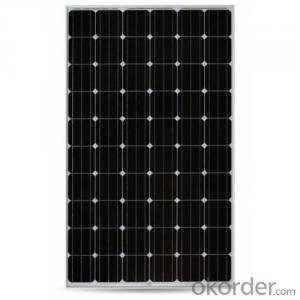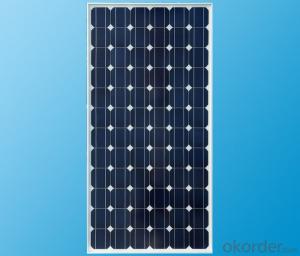220W Mono Solar Panels with Grade A Solar Cells - Solar Panels Wellington
- Loading Port:
- Shanghai
- Payment Terms:
- TT OR LC
- Min Order Qty:
- 10000 watt
- Supply Capability:
- 1000000 watt/month
OKorder Service Pledge
OKorder Financial Service
You Might Also Like
Specification
Product Description
220 W >18.6% 25 Year Warranty Mono/Poly Best Solar Panels 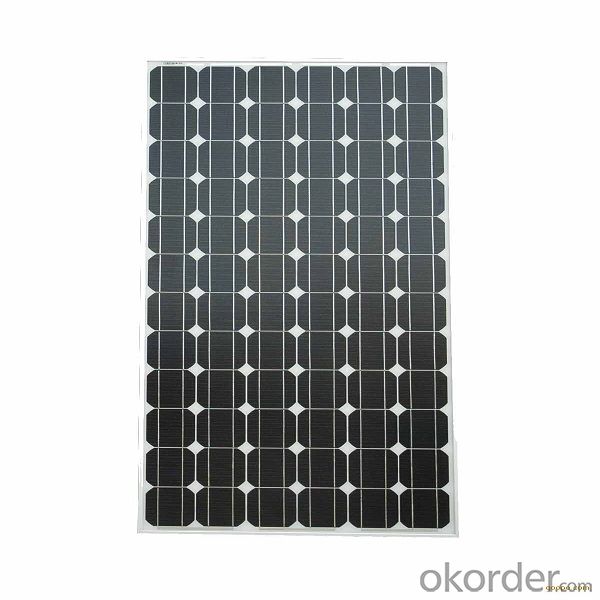 Specifications for best solar panels:
Specifications for best solar panels:
| Type of cell | Poly/Mono |
| Max. power (Wp) | 220W |
| Max. power voltage (V) | 37V |
| Max. power current (A) | 5.5A |
| Open circuit voltage (V) | 44.6V |
| Short circuit current (A) | 6A |
| Number of cells (Pcs) | 72 |
| Size of module (mm) | 1580*808*35mm |
| Max. system voltage (V) | 1000 |
| Temperature coefficients of Isc (%) | + 0.1/ °C |
| Temperature coefficients of Voc (%) | -0.38/ °C |
| Temperature coefficients of Pm (%) | -0.47/ °C |
| Tolerance Wattage (e.g. +/-3%) | +/-3% |
| Surface Max. Load Capacity | 60m/s(200kg/sq.m) |
| Weight per piece (kg) | 16kg |
| Junction Box Type | 4m, length 1000MM,TUV |
| Connectors and Cables Type | Type MC4 |
| Output Cables (mm) | φ=4mm², L=900mm |
| Cell Efficiency (%) | ≥18.6% |
| Output tolerance (%) | +/-3% |
| Frame (Material, Corners, etc.) | Aluminum |
| Front Glass | 3.2mm high transmission, Low Iron, Tempered Glass |
| Warranty | 10Years products warranty and 25 years 80% of power |
| Standard Test Conditions | AM1.5 1000mW/cm2 25°C |
| FF (%) | 72% |
| Operating temperature ºC | -40 ºC ~+85 ºC |
| OEM | Available |
Packaging for best solar panels:
2pcs/carton, 310pcs/20GP or custom
Advantages for best solar panels:
1.Long Service Life can reach more than 25 years
2.High Efficiency Solar Cells
3.Special Aluminum Frame Design,
4.High Transmission, Low Iron Tempered Glass
5.Advanced Cell Encapsulation.
6. Fast delivery.
Best Solar Panels Application:
1. Solar power station, field operation some huge engineer construction;
2. Living house and home building;
3. Office building, factory and warehouse;
4. other industrial and commercial applications.
- Q: Are solar panels safe?
- Yes, solar panels are safe. They do not produce any harmful emissions or pollutants during operation, and the technology has been extensively tested and regulated to ensure safety. However, it is important to follow proper installation and maintenance procedures to minimize any potential risks.
- Q: Can solar panels be used for powering construction sites?
- Yes, solar panels can be used to power construction sites. They are a sustainable and environmentally friendly alternative to traditional power sources, providing clean energy to run construction equipment, lighting, and other electrical needs on site. Solar panels can be installed on rooftops, scaffolding, or ground-mounted systems, and can help reduce reliance on fossil fuels while minimizing noise and emissions.
- Q: Hi, I want to put some solar light in my yard, and wondering if a 00w solar panel could work for a few 3w dc lights....do i need a battery so they run at night, if so how many lights do u think i can run/ also i see elading solar light
- 3 w for 2 hours/night is 36 watt hours. You'll get about 500 watt hours/day from your panel on the average, which for a 2 volt battery is about 40 ampere hours. You can get an 80 amp-hour sealed gel cell battery to charge with this panel (with a suitable charge controller). You want to size your lights so the battery can provide three days of light without discharging it more than 50%, so that's abnout 600 watt-hours/3/36 = about 4 orf 5 lights. Cost for this system woulkd be over $500. The advantage of the self contained light is they use a lithium or nickel battery rather than a lead acid, so it can run totally dead without damage (unmlike a sealed lead-acid battery). That would be a far cheaper way to go. DK
- Q: I have a playstation PSP charger that is 5v 2A, so it takes 0 watts.I have several small solar panels that put out watt a piece and are 4 volts, 250mAhow can I get my 0 watts to be 5v 2A instead of 4v 250mA? the voltages have to match up right?also, what's a 3-T regulator that controls voltage?
- 3-T is just one type of many devices designed to control voltage so you get the amount you desire with as little static as possible. Without you having an degree in engineering, I can't explain it to you any better. You will also need to produce true sine wave energy or you will burn out your PSP with the correct volts and amps. You need one to produce only 5 volts 2amps. Anything different will burn out yur PSP. Your problem is simple math. Watts = volts multiplied by amps. Amps = Watts divided by volts. So if your solar panels can produce /4 amp ( 250 mA) each, then you connect one to the other in a series until you get enough connected to make 2A. ( 8 panels { /4mA x 8 = 2A}) You now have a panel with 32Volts, 2Amps, 64 Watts. This is where the T-3 regulator comes in. If you buy one for 5 volts, it will allow only 5 volts 2 amps, to go to your PSP.
- Q: I want to build a solar panel
- Did okorder / . This will absolutely save yourself!
- Q: Can solar panels be used to power a theme park?
- Yes, solar panels can be used to power a theme park. Solar energy is a renewable and sustainable source of power that can be harnessed to meet the energy needs of various establishments, including theme parks. By installing a sufficient number of solar panels, a theme park can generate enough electricity to power rides, lighting, and other facilities, while also reducing its carbon footprint and operating costs.
- Q: Which of these units determines how much electric energy a solar panel can generate?
- Light is power in the form of electromagnetic radiation from the sun. We receive about 000 watts per square meter on a sunny day. The solar panels do convert that sunlight into electrical power at a little less than 25% efficiency. Light intensity and power per square meter (W/m^2) are closely related. The more intensity, the more watts per square meter. So the answer is : Yes, from light intensity which directly proportional to watts per square meter
- Q: Can solar panels be installed in areas with high levels of air pollution?
- Yes, solar panels can be installed in areas with high levels of air pollution. While air pollution may slightly reduce the efficiency of solar panels by blocking sunlight, they can still generate electricity even in polluted environments. Regular maintenance and cleaning of the panels can help mitigate any potential impact on their performance. Additionally, solar energy remains a sustainable and environmentally friendly option, regardless of air pollution levels.
- Q: Can solar panels be installed on a multi-story building?
- Yes, solar panels can be installed on a multi-story building.
- Q: what are the main minerals that are used in making solar panels. and where in the world are those minrelas usually found
- Heating panels have aluminum for the frame, glass for the top, copper pipes running through them, and possibly some plastic parts. The raw materials are easily obtained. Copper is the most difficult to get probably, but it's not all that rare, since we used to make pennies out of it. A solar electric panel is similar, with the copper used for wires and interconnect instead of pipes. The actual solar cells commonly used are almost completely pure silicon, which is abundant worldwide. There are traces of other elements in the silicon like boron, arsenic or phosphorous - these are also inexpensive, and easy to get.
Send your message to us
220W Mono Solar Panels with Grade A Solar Cells - Solar Panels Wellington
- Loading Port:
- Shanghai
- Payment Terms:
- TT OR LC
- Min Order Qty:
- 10000 watt
- Supply Capability:
- 1000000 watt/month
OKorder Service Pledge
OKorder Financial Service
Similar products
Hot products
Hot Searches
Related keywords
